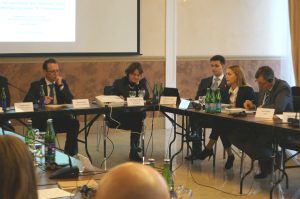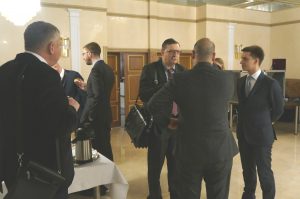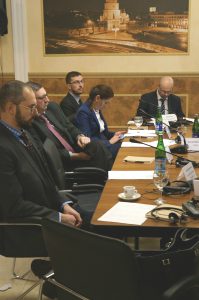The EU-STRAT Kyiv Policy Briefing took place on November 14, 2016, in Hotel Kyiv. The event was organized by the Ukrainian Institute for Public Policy with the participation of other partners of the project consortium, the University of Birmingham and ESTEP. The purpose of the briefing was to present the EU-STRAT project and discuss how the EU-Ukraine Association Agreement (AA), and the Deep and Comprehensive Trade Agreement (DCFTA) in particular, is shaping Ukraine’s economy.
The panelists and keynote speakers represented the Ukrainian government and the research and expert communities: Kataryna Wolczuk and Rilka Drageva-Lewers from the University of Birmingham, Algirdas Šemeta, the Business Ombudsman, Igor Burakovskiy from the Institute for Economic Research and Policy Consulting, Andriy Nikitov from Ministry of Foreign Affairs (MFA), Anna Artemenko from the Antimonopoly Committee, Darius Žeruolis from ESTEP, and Ildar Gazizullin from the Ukrainian Institute for Public Policy (UIPP).
Maxim Boroda and Ildar Gazizullin from UIPP opened the briefing by presenting the EU-STRAT motivation and objectives. Andriy Nikitov from the MFA suggested that the EU should take a differentiated approach to the Eastern Partnership (EaP) countries but not lower the targets because of different speeds of integration. Rilka Dragneva-Lewers from the University of Birmingham presented some of the internal and external challenges for the EU-Ukraine cooperation, stemming from the complexity of the Association Agreement itself (which makes its implementation a difficult task prolonged in time), Brexit, strong opposition to EU expansion in Italy and France, anti-liberal sentiments in Poland and Hungary, and finally, the the Ukraine-Russia conflict.
During the Q&A session the participants discussed a number of issues, for example, the importance of establishing DCFTA dialogue platforms between the government and businesses and the role of the AA as a transformational instrument.
Overall, the briefing participants concluded that DCFTA could become a foundation for long-term political and economic transformation of Ukraine. It was recommended to establish clear links of the many and currently unknown Europeanization activities with specific positive impacts. Such information should be communicated regularly to the key stakeholders to ensure that there is continuing support on the implementation path.



